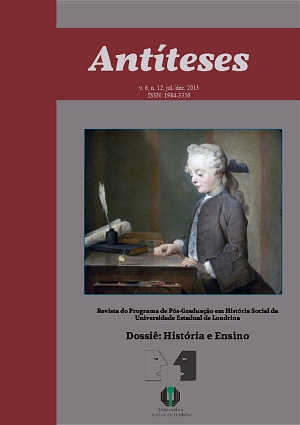Autoritarismo, controle e vigilância: Jacob Gorender na mira da repressão (1940-1980)
DOI:
https://doi.org/10.5433/1984-3356.2013v6n12p341Palavras-chave:
Autoritarismo, Repressão, Jacob GorenderResumo
O propósito do artigo é demonstrar através da análise dos documentos de natureza repressiva, os elementos destacados pela Justiça Militar para compor o rastro de perseguições aos intelectuais entre outros setores sociais que ousaram desafiar a (s) Ditadura (s). O mapeamento completo, envolvendo as estratégias de combate ao “comunismo”, englobando conhecimento dos partidos e dos seus quadros militantes, foi acumulado por órgãos policiais e militares ao longo do século XX. Buscamos acompanhar, através desses registros, a trajetória política do intelectual Jacob Gorender. Como jornalista, envolveu-se na discussão sobre a participação brasileira na II Guerra Mundial, ingressando em 1943 na FEB. Antes, porém, Gorender tornou-se comunista, recrutado por Mário Alves em 1942. Até meados dos anos sessenta, atuou como militante e dirigente do PCB, quando resolveu ingressar no PCBR, fundado em 1968. O historiador, nos momentos iniciais do Golpe de 1964, já com a vida devastada pela Comunidade de Informação e Segurança, experimentou a clandestinidade, prisão, tortura e censura aos seus escritos entre outros abusos que atingiram também os amigos mais próximos, companheiros de partido e familiares. O cruzamento dessas informações com os textos memorialísticos ajudam a compreender as artimanhas da repressão política e os diferentes projetos de Revolução em curso.Downloads
Referências
GORENDER, Jacob. Combate nas trevas: a esquerda brasileira: das ilusões perdidas à luta armada. São Paulo: Ática, 1987.
GORENDER, Jacob. Entrevista para o programa Memória Roda Viva. Realização Fundação Padre Anchieta, Labjor/Unicamp – Nepp/Unicamp, 2006.
GORENDER, Jacob. Entrevista. Por José Corrêa Leite. Revista Teoria e Debate, São Paulo, n. 43, jan./mar. 2000. Disponível em: www2.fpa.org.br. Acesso em: 13 abr. 2009.
GORENDER, Jacob. Entrevista. Projeto Memória do Movimento Estudantil. Por Ana Paula Goulart e Angélica Muller. 15 jun. 2005. Disponível em: www.memoriaestudantil.org.br. Acesso em: 13 abr. 2009
GORENDER, Jacob. Era o golpe de 64 inevitável? In: TOLEDO, Caio Navarro de (Org.). 1964: visões críticas do golpe: democracia e reforma no populismo. Campinas: Unicamp, 1997.
VILLAMÉA, Luiza. De braço dado com o inimigo. Nova edição de Combate nas Trevas relata proposta de aliança feita, em 1969, por general de linha-dura ao guerrilheiro Marighella. Isto É, São Paulo, 6 maio 1998. Disponível em: www.terra.com.br/istoé/politica/149227.htm. Acesso em: 13 abr. 2009.
Downloads
Publicado
Como Citar
Edição
Seção
Licença
A Revista Antíteses adota a Licença Creative Commons Attribution 4.0 International, portanto, os direitos autorais relativos aos artigos publicados são do(s) autor (es), que cedem à Revista Antíteses o direito de exclusividade de primeira publicação.
Sob essa licença é possível: Compartilhar - copiar e redistribuir o material em qualquer suporte ou formato. Adaptar - remixar, transformar, e criar a partir do material, atribuindo o devido crédito.
https://creativecommons.org/licenses/by/4.0/













